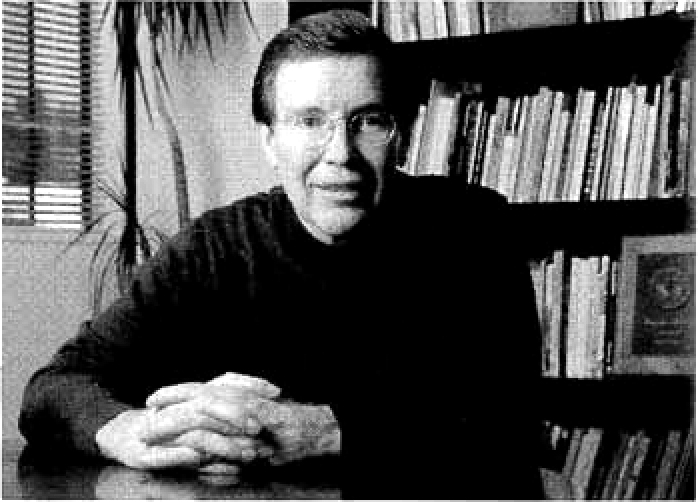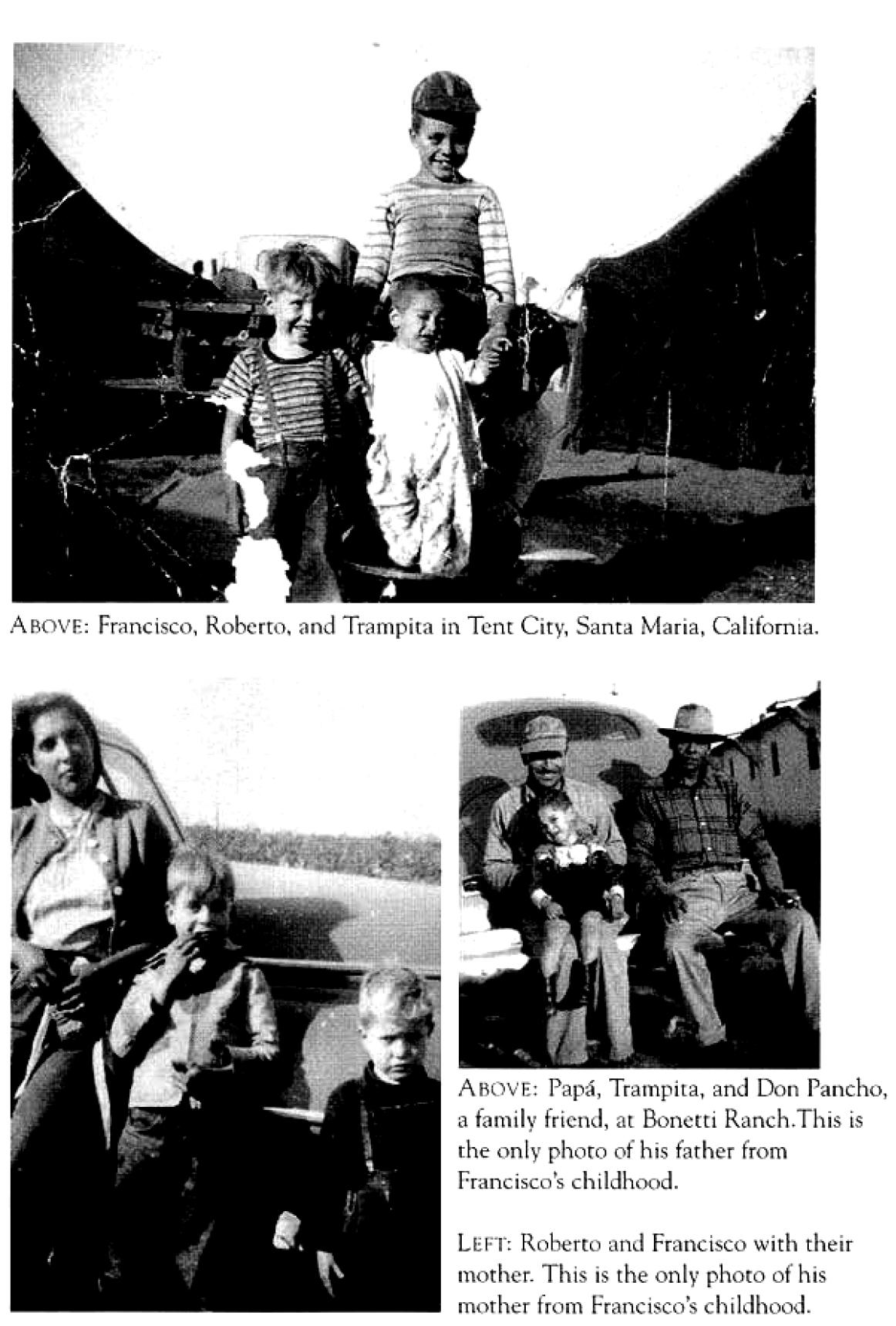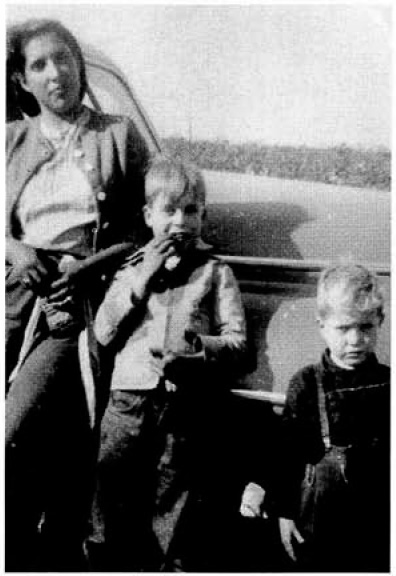Reaching Out (18 page)
Authors: Francisco Jiménez

At the end of the ceremony, I made my way to the front of the Mission Church, where countless families and friends were hugging and congratulating graduates and taking pictures. I spotted my family, waved, and moved through the crowd to meet them. Roberto caught my eye and walked toward me, followed by the rest.
"We're proud of you, Panchito!" He gave me a strong, warm hug. I hugged him back, resting my chin on his broad shoulder.
"Congratulationsâyou did it!" Darlene exclaimed.
"We all did it," I responded. "I had a lot of help, especially from you and Toto."
"
¡Estoy muy orgullosa de ti, mijo
!" my mother said, tearing up and stroking my left cheek with her right hand. I'm so proud of you.
I embraced her. Torito, Rubén, and Rorra encircled us, locked bands, and hugged both of us. From the corner of my eye, I saw Emily and her mother and Laura standing on the side.
"Mamá, these are my best friends, Laura Facchini and Emily Bernabé and her mother."
"Pleased to meet you," my mother said, smiling and wiping her tears with a white embroidered handkerchief. Although I had not seen it for many years, I recognized it right away. I was surprised she still had it. My father had given it to her one Christmas. My family had moved to Corcoran that winter to pick cotton, after having picked grapes in Selma. It was a very difficult winter. It rained day after day, and we went weeks without work because we were not allowed to pick cotton when it was wet. Our family, like many other migrant families living in that labor camp, struggled to get by. A young man and his wife came to our cabin trying to sell their meager possessions to buy food. We were broke too, but my father wanted to help them. He bought the handkerchief, which the wife had embroidered, and surprised my mother with it on Christmas Day.
Remembering my father's goodness and loving gesture that Christmas made me miss him even more.
"Panchito has told me about all of you," my mother said. Then, directing her attention to Mrs. Bernabé, she said, "Thank you for taking care of Panchito and treating him like a son."
"He's a good boy ... most of the time," Mrs. Bernabé said, winking at my mother.
"Panchito told me your cooking is just as good as mine," my mother said. Then with a big grin, she added, "You must be a great cook."
"You must be too," Mrs. Bernabé responded.
"Let me take a picture of the four of you," Darlene said, taking the camera from Roberto and snapping it: Laura and Emily standing to my right and Emily's mother to my left. After taking more pictures, we all headed to the Pine Cone Inn for lunch.
At the restaurant we sat at a long table near the entrance and ordered. Roberto, who was across from me, excused himself and returned with two gifts, a large one and a small one. He handed me the large one with a card. I read it silently:
Â
Panchito, on our way to your graduation, I did a lot of thinking on the road. I teas thinking of the way we used to when we were little. What brought this to my mind was when I saw people working in the fields along the way near Gonzales. I also remembered the day you went off to college. I had mixed emotions. By this I mean I was happy for you but at the same time I didn't want you to go because I was going to miss you. I thought of your graduating from college and I feel so proud that my heart feels like bursting.
Love
,
Toto
Â
"Thank you, Toto." I felt a lump in my throat. Darlene, who was sitting next to him, put her arm around him and tenderly kissed him on the cheek. I took a sip of water, cleared my throat, and tore the gift open. It was a small blue portable typewriter with a case.
"Darlene and I figured you'd need it at Columbia. Smokey won't be around to loan you his," he said, smiling and wiping his eyes.
"This is perfect. Thank you..." I placed it back in the box.
My mother began to choke up. "Columbia is so far,
mijo.
! wish you didn't have to go so far."
"Panchito needs to open another gift," Roberto said, noticing my uneasiness. "This one is from Mrs. Hancock." He handed me a card and a small box wrapped in blue paper. The card read: "The Captain and I are very proud of you. Congratulations and good luck at Columbia. Affectionately, Marian Hancock." Inside the box was a round, gold-colored wristwatch. I strapped it on my left hand and showed it off. Torito, who was sitting next to me, pulled my hand down to see it.
"It has no numbers; you won't be able to tell time."
"That's why I am going to Columbia. I need to learn my numbers, but time is on my side." Everyone booed politely at my bad joke.
After we finished eating, I raised my glass of water to make a toast: "I want to thank all of you for making a difference in
my life. Thank you, Mamá, for your courage, faith, and love; Toto, for your sacrifices for our family and for being like a second father to me; Darlene, for your hospitality and love; Emily and Mrs. Bernabé, for giving me a home away from home; and Laura, for your friendship and wisdom and for accepting me for who I am."
"What about Torito, Rubén, and me?" Rorra protested.
"Thanks for being great brothers and a terrific sister ... and for taking my pennies, Rorra," My sister made a bad face and crossed her arms, pretending to be upset. We looked at each other and laughed.
The waitress came by and handed me the check, Roberto tried to snatch it from me, but I quickly hid it behind my back. "Let me pay," he insisted. My brother was squeezed between my mother and Darlene, so he couldn't easily move away from the table. I rushed and paid the bill before he could get to the cashier. "I am your big brother and you have to obey me," he said halt seriously.
"I know, but it's the least I can do to thank all of you for helping me."
"You've always been stubborn."
We left the restaurant in the middle of the afternoon and went back to the university. After we said goodbye to Emily and her mother, my family came up to my room in Dunne and rested while Laura and I went to visit Smokey and his wife, Mary, whom he had married during Christmas break of our senior year. They lived a few blocks away from campus,
on Homestead Avenue. We stayed there briefly, and then I drove Laura to the Santa Clara train station to take the train back home to San Carlos. We sat in the car waiting for the train.
"I have a graduation gift for you," she said. She reached into her purse, pulled out a tiny box wrapped in yellow paper, and handed it to me.
"Thank you, but you didn't have toâ"
"I know. I hope you like it."
I slowly unwrapped it, trying not to tear the paper, which was the same color as her dress. I carefully folded the wrapping, placed it in my shirt pocket, and opened the small black velvet box. "These are beautiful!" I took out a pair of oval-shaped gold-brushed cufflinks and a tie clip to match. "Thank you, thank you!" I reached over and gave her a kiss. We heard the train whistle.
"The train's coming," she said.
"I hate goodbyes," I said, feeling a pain in my chest.
"I do too." She had a sad smile on her face.
I got out of the car, went around it, and opened the door for her. "I'll write," I said. "Maybe I can borrow my brother's car and come up on a weekend during the summer and visit." My voice cracked.
"I'd like that very much."
She boarded the train, looked out the window, and waved goodbye. I waved back and followed the train with my eyes until it disappeared.
Â
The days that summer seemed to go by more quickly than in previous summers even though the routine was the same: I worked for the Southern Counties Gas Company during the day, five days a week, painting meters and dispensing supplies from the warehouse, and in the evenings and on weekends for the Santa Maria Window Cleaners. Again, I lived with Roberto and Darlene and visited my mother, Trampita, Torito, Rubén, and Rorra only on Saturdays and Sundays after work. What differed, however, was that at the end of every day I went home excited, hoping to receive mail from friends I had made at Santa Clara, especially Laura, whom I visited once during that time. I could not see her more often because I had to work.
As time passed, I became more and more nervous and began to make preparations to leave home and move to Mew York. I bought a small used foot locker at the Salvation Army, packed it with my clothes and books, and shipped it by Greyhound bus to my new address: 817 John Jay Hall, Columbia University. I hated to move again. As a child, I had yearned for stability, for a place I could call my own. The sense of permanence that I had found living in Bonetti Ranch and at Santa Clara was now gone.
Saying goodbye to my family at the bus terminal on the day I left for Columbia was just as sad and difficult as the day I went to college my freshman year. This time, though, I was going far away. After hugging and kissing everyone, I boarded the bus. I took with me the card of the
Virgen de Guadalupe
that my father had given me on the first day of college, the portable typewriter, and the notebook in which I had jotted down recollections
about my childhood experiences during college. I waved to my family from the window and cried silently, knowing that I would not see them again for an entire year. Travel was too expensive to come home for holidays.
In San José, I transferred to another bus that took me directly to the San Francisco International Airport. I went up to the airport counter to check in.
"Your name, please?" the attendant asked.
"Francisco Jiménez," I responded.
"Going to the Big Apple."
"Yes, I am going to graduate school to become a college teacher."

Â
Reaching Out
, like my previous works,
The Circuit: Stories from the Life of a Migrant Child
and
Breaking Through
, is autobiographical. In this book, I relate my experiences as a college student from an immigrant Mexican family of migrant workers. From the perspective of the young adult I was then, I describe the challenges I faced in my efforts to continue my education, such as coping with poverty, feeling torn between my responsibilities as a student and my sense of duty to my family, having self-doubt about being capable of succeeding academically, and trying to adjust to an environment that was different from the community in which I was raised.
In writing
Reaching Out
, I relied mostly on my memory but also on my powers of imagination and invention to fill in small details that I had forgotten with the passage of time. For example, when I could not remember some conversations word for word, I approximated or created dialogue and added description to capture the essence of my impressions and reactions to particular events and experiences.
Besides relying on the power of memory and inventiveness, I used other valuable resources to write my book. I interviewed family members, friends, classmates, and teachers. I looked through the few family photographs we had, as well as letters, yearbooks, the Santa Clara University student newspaper, my college research papers and essays and notes on my childhood memories, and official documents, including my school records and naturalization papers, which I obtained through the Freedom of Information Act.
I wrote
Reaching Out
in part to describe the experiences of many students who are the first in their immigrant families to attend college and to pay tribute to teachers who reach out and make a difference in the lives of their students by assisting them to be knowledgeable of self, educated in mind, compassionate in heart, and generous and responsive to social and civic obligations in an ever-changing world.

A
BOVE
: Francisco, Roberto, and Trampita in Tent City, Santa Maria, California.
Â

